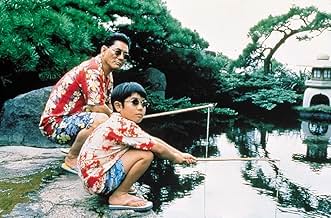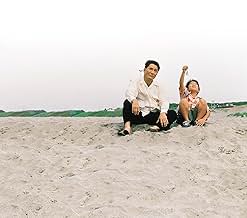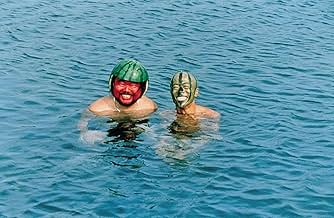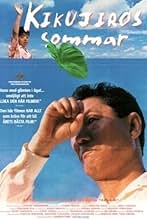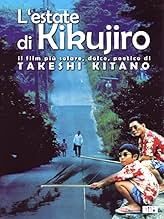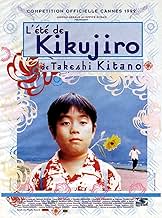IMDb-BEWERTUNG
7,7/10
23.070
IHRE BEWERTUNG
Ein naiver Junge macht sich alleine auf die Suche nach seiner eigensinnigen Mutter. Bald findet er in einem schrulligen Mann einen ungewöhnlichen Beschützer und die beiden erleben unterwegs ... Alles lesenEin naiver Junge macht sich alleine auf die Suche nach seiner eigensinnigen Mutter. Bald findet er in einem schrulligen Mann einen ungewöhnlichen Beschützer und die beiden erleben unterwegs eine Reihe von unerwarteten Abenteuern.Ein naiver Junge macht sich alleine auf die Suche nach seiner eigensinnigen Mutter. Bald findet er in einem schrulligen Mann einen ungewöhnlichen Beschützer und die beiden erleben unterwegs eine Reihe von unerwarteten Abenteuern.
- Regie
- Drehbuch
- Hauptbesetzung
- Auszeichnungen
- 4 Gewinne & 4 Nominierungen insgesamt
Takeshi Kitano
- Kikujiro
- (as Beat Takeshi)
The Great Gidayû
- Biker
- (as Gurêto Gidayû)
Beat Kiyoshi
- Man at Bus Stop
- (as Bîto Kiyoshi)
Yôji Tanaka
- Yakuza Henchman
- (as Yoji Tanaka)
Empfohlene Bewertungen
In the title role of this highly original 1999 road movie, Beat Takeshi - with his twitching eye and bow-legged shuffle - looks and acts like a cross between Mickey Rourke and Harvey Keitel with a heavy dose of Walter Matthau's sourpuss demeanor (circa "The Bad News Bears") for good measure. He creates a truly memorable character - cynically profane, unapologetically insulting, childishly manipulative and somehow likable. As the director and screenwriter of said film, Takeshi Kitano - the same guy - has fashioned something quite unique from a tired premise - a boy's search for his mother and the gruff man who begrudgingly helps find her. What could have been a predictable and sentimental wallow, especially with the indiscriminate use of angels as a pervasive symbol, is instead an idiosyncratic, emotionally adroit film that sometimes simmers on the cusp of violence.
Yet it becomes ultimately affecting almost in spite of itself. In fact, Kitano does such a resolutely offbeat job that at certain times, the film reminds me of the narrative ellipses and low steady shots that were the trademark of Yasujiro Ozu's home dramas, intermingled with a surprisingly intense Quentin Tarantino-like, in-your-face edginess. The protagonist of the film is really the latch-key nine-year old, Masao, who is on a quest to find the mother whom his grandmother says is "away working". With his sad eyes and cherubic face, Yusuke Sekiguchi is perfectly cast as Masao providing the moral compass for the story. Whether he is running with his arms flailing or forlornly playing soccer by himself, he is poignant without being saccharine and completely natural. It is Masao's scrapbook that provides the framework for the film lending each chapter a descriptive title. Every chapter has a distinct character that is, in various turns, playful, hilarious, disturbing, surreal and heartbreaking. Case in point: Kitano is not afraid to use a child molester as first an uncomfortable source of black humor and then as the subject of Masao's nightmare. My favorite scenes come toward the end when Kikujiro organizes a motley crew of misfits to play games with Masao and have them masquerade as Indians, aliens, marine life and even watermelons. The variety in tone between chapters makes for unexpected tonal shifts, but somehow it works and adds to the greater context of the story.
That Kitano is able to manage a consistent film-making style with a strong visual sense is a credit to the talent behind the camera - not only Kitano's direction, script and film editing but also his artwork showcased throughout the movie, Katsumi Yanagishima's sharply rendered cinematography and Joe Hisaishi's evocative Windham Hill-like score. There are some funny sideline performances from Gidayu Great and Rakkyo Ide as Fatso and Baldy, two bikers who turn out to be the Abbott and Costello of soft-hearted slackers; Nezumi Mamura as a free-spirited drifter; Fumie Hosokawa as a relentlessly perky girl with a talent for juggling; and in the opening sequence, Kayoko Kishimoto as Kikujiro's take-no-prisoners wife. Kitano, however, elicits the most laughs if only for the film's central conceit that he gets away with his infantile gangster behavior. One would think the story would climax when Masao comes upon his mother, but Kitano confounds expectations with every new scene. The DVD really has no extras other than a couple of trailers not related to the film (not coincidentally, one is for Walter Salles' "Central Station" which has a similar story structure). I know this film has its detractors, especially among fans of Kitano's bloodier work, but I find it intriguingly ambiguous and thoroughly enjoyable.
Yet it becomes ultimately affecting almost in spite of itself. In fact, Kitano does such a resolutely offbeat job that at certain times, the film reminds me of the narrative ellipses and low steady shots that were the trademark of Yasujiro Ozu's home dramas, intermingled with a surprisingly intense Quentin Tarantino-like, in-your-face edginess. The protagonist of the film is really the latch-key nine-year old, Masao, who is on a quest to find the mother whom his grandmother says is "away working". With his sad eyes and cherubic face, Yusuke Sekiguchi is perfectly cast as Masao providing the moral compass for the story. Whether he is running with his arms flailing or forlornly playing soccer by himself, he is poignant without being saccharine and completely natural. It is Masao's scrapbook that provides the framework for the film lending each chapter a descriptive title. Every chapter has a distinct character that is, in various turns, playful, hilarious, disturbing, surreal and heartbreaking. Case in point: Kitano is not afraid to use a child molester as first an uncomfortable source of black humor and then as the subject of Masao's nightmare. My favorite scenes come toward the end when Kikujiro organizes a motley crew of misfits to play games with Masao and have them masquerade as Indians, aliens, marine life and even watermelons. The variety in tone between chapters makes for unexpected tonal shifts, but somehow it works and adds to the greater context of the story.
That Kitano is able to manage a consistent film-making style with a strong visual sense is a credit to the talent behind the camera - not only Kitano's direction, script and film editing but also his artwork showcased throughout the movie, Katsumi Yanagishima's sharply rendered cinematography and Joe Hisaishi's evocative Windham Hill-like score. There are some funny sideline performances from Gidayu Great and Rakkyo Ide as Fatso and Baldy, two bikers who turn out to be the Abbott and Costello of soft-hearted slackers; Nezumi Mamura as a free-spirited drifter; Fumie Hosokawa as a relentlessly perky girl with a talent for juggling; and in the opening sequence, Kayoko Kishimoto as Kikujiro's take-no-prisoners wife. Kitano, however, elicits the most laughs if only for the film's central conceit that he gets away with his infantile gangster behavior. One would think the story would climax when Masao comes upon his mother, but Kitano confounds expectations with every new scene. The DVD really has no extras other than a couple of trailers not related to the film (not coincidentally, one is for Walter Salles' "Central Station" which has a similar story structure). I know this film has its detractors, especially among fans of Kitano's bloodier work, but I find it intriguingly ambiguous and thoroughly enjoyable.
10nizsu
I have heard a lot of people said that this film was not recognized as much as his other films. What a shame! When I saw the tittle of the film, I was surprised. The tittle is Kitano's father name.
In Kitano's biography, it is said that "Kitano's father was an alcoholic and would spend most of the money he earned on alcohol, and when he had been drinking, he would become violent and beat up both his wife and his kids. Eventually, Kikujiro left his family".
I know Kitano Takeshi made this film because he has been tired of violence/gangsters/life&death in his previous film, but what made him writing a story about his father-a man who abandoned his family when Kitano was young. If you read Kitano Takeshi's biography, you should see his childhood memory in Masao. Kikujiro ( in the film) is a corrupted person. But also in the film, Masao eventually respects and loves to play with that childish man who keeps smoking and shouting at people. Does Kitano himself desire a father too much, so he is willing to accept his father's bad habits as long as his father is still at his side.
It is not really a film I'd say, I feel like I am seeing the characters in real life. From the start, Masao has drawn Kikujiro in his diary. The ending is also the beginning. Kitano didn't make a happy ending nor a sad ending. Our 3 hours is just to see the beginning of a father-and-son relationship which would grows by the time. Remember, Masao just knew Kikujiro's name in the end of the film, and Kikujiro said: "Let's do it again some time". The cycle of life in "Kikujiro" go on forever. The feeling is too real. I have forgot that I were watching a movie. There is no simple words that can describe this movie completely, u have to watch it by yourself
In Kitano's biography, it is said that "Kitano's father was an alcoholic and would spend most of the money he earned on alcohol, and when he had been drinking, he would become violent and beat up both his wife and his kids. Eventually, Kikujiro left his family".
I know Kitano Takeshi made this film because he has been tired of violence/gangsters/life&death in his previous film, but what made him writing a story about his father-a man who abandoned his family when Kitano was young. If you read Kitano Takeshi's biography, you should see his childhood memory in Masao. Kikujiro ( in the film) is a corrupted person. But also in the film, Masao eventually respects and loves to play with that childish man who keeps smoking and shouting at people. Does Kitano himself desire a father too much, so he is willing to accept his father's bad habits as long as his father is still at his side.
It is not really a film I'd say, I feel like I am seeing the characters in real life. From the start, Masao has drawn Kikujiro in his diary. The ending is also the beginning. Kitano didn't make a happy ending nor a sad ending. Our 3 hours is just to see the beginning of a father-and-son relationship which would grows by the time. Remember, Masao just knew Kikujiro's name in the end of the film, and Kikujiro said: "Let's do it again some time". The cycle of life in "Kikujiro" go on forever. The feeling is too real. I have forgot that I were watching a movie. There is no simple words that can describe this movie completely, u have to watch it by yourself
Kikujiro is a movie with beautiful calmness that's a great diversity from the fast cut movies today. Takeshi Kitano proofs once and for all, that he's a master filmmaker that will forever be remembered. And even though he dislikes the fame that goes along with his more successful movies (Zatoichi), it's a shame he doesn't get more recognition for his films.
Kikujiro no natsu tells the story of a kid who decides to visit his mother that he never met. Through odd circumstances kikujiro (Kitano), though absolutely unqualified, is forced to lead the kid. But as we see only moments later the boy would be better off alone, as kikujiro's fondness of gambling and (very amusing) way to treat people makes the journey a funny and quite touching odyssee.
What stands out in this movie is the simple comedy. It shows Kitano started off as a comedian, and his dialogue and acting made me almost spill my milk more than a few times. This is certainly one of his best. A great film for a quiet, rainy sunday afternoon.
Kikujiro no natsu tells the story of a kid who decides to visit his mother that he never met. Through odd circumstances kikujiro (Kitano), though absolutely unqualified, is forced to lead the kid. But as we see only moments later the boy would be better off alone, as kikujiro's fondness of gambling and (very amusing) way to treat people makes the journey a funny and quite touching odyssee.
What stands out in this movie is the simple comedy. It shows Kitano started off as a comedian, and his dialogue and acting made me almost spill my milk more than a few times. This is certainly one of his best. A great film for a quiet, rainy sunday afternoon.
From its hauntingly beautiful soundtrack by Joe Hisaishi to the wonderful characters who inhabit Takeshi Kitano's magical Japan - everything in this movie comes together to make this one of modern cinema's truly underrated masterpiece.
The story involves a petty thug, Kikujiro, who is coerced into accompanying a young boy, Masao, on his cross country journey to find his birth mother. Along the way they meet a whole host of characters. Some friendly, some mysterious, some quirky, some abrasive, but all of them refreshingly human.
A lesser writer or director would have settled for a quick dose of weirdness from the main characters' fellow wanderers, but Takeshi Kitano milks them for all of the depth and endearment that the too few minutes we are graced with their presence allows.
If you enjoyed the whimsical, go-nowhere feel of Lost in Translation, you will LOVE this movie. In my opinion Beat Takeshi's efforts blow Sophia Coppola's out of the water.
Nine out of ten.
The story involves a petty thug, Kikujiro, who is coerced into accompanying a young boy, Masao, on his cross country journey to find his birth mother. Along the way they meet a whole host of characters. Some friendly, some mysterious, some quirky, some abrasive, but all of them refreshingly human.
A lesser writer or director would have settled for a quick dose of weirdness from the main characters' fellow wanderers, but Takeshi Kitano milks them for all of the depth and endearment that the too few minutes we are graced with their presence allows.
If you enjoyed the whimsical, go-nowhere feel of Lost in Translation, you will LOVE this movie. In my opinion Beat Takeshi's efforts blow Sophia Coppola's out of the water.
Nine out of ten.
Vignettes of childhood memories - possibly Kitano's own childhood experiences and impressions, "Kikujiro" is not like the deep or layered deliveries Kitano has in "Fireworks" (Hana-bi) 1997, or "Sonatine" 1994. There are no cops or graphic depictions of violence. There are still some gangster-type characters, but the encounters are simple, requiring no synthesis. Kitano's familiar elements and locales are present: drawings, vignettes, seaside, temple, and angels.
It's really a loving portrayal of one little boy, Masao's, summer, spent with this seemingly eccentric retired gangster "Mister" played by Kitano. We have a pair of comic bikers, a lone van traveler, an arguing truck driver, a fun juggling couple, prankish hitchhiking gags, and a rather extensive betting session at the (bicycle) races. There are occasions for sentimental tears, for instance, when "Mister" took a side trip to visit his own mother; but play is the key operative here. Even though the child appears to be a sulky non-smiling little boy most of the time, a boy will be a boy when it comes to play and open up to lightness of the heart.
If you're the hurrying kind, this film may not be for you. The film is at its own flow and pace. It's Masao's summer vacation adventures, and he's not in a hurry to go home. Joe Hisaishi's theme music for "Kikujiro" certainly is catchy and the score gave Kitano's film its rhythm and accents along this unlikely pair's journey - a grown man, who's become childlike once more while escorting Masao on his quest to fulfill the dream of seeing his mother. Does it matter whether Masao sees his mother or not? He gains a friend, Kikujiro.
Kudos to Sony Pictures Classics for their film distribution selections! At the recent Bravo cable channel's IFC (Independent Film Channel) tenth Gotham Awards, Catherine Deneuve presented the Industry Lifetime Achievement Award to the trio: Tom Bernard, Marcie Bloom, Michael Barker. It was noted: "This award is being created specifically for this year's ceremony to honor the trio for their 20 years of service as champions of independent filmmakers." Besides the theme from Woody Allen's "Sweet and Lowdown", Joe Hisaishi's music from "Kikujiro" was mostly used during the montage of the film clips. Films the trio has co-produced include the popular 1999 Tom Tykwer's "Run Lola Run" (German), Pedro Almodovar's 1999 triumph "All About My Mother" (Spanish), the Brazilian gem in 1998 "Central Station", Hal Hartley's 1997 saga "Henry Fool", John Sayles' 1996 hit "Lone Star", the 1995 French surprise "The City of Lost Children", and as far back as 1971 Vittorio De Sica's "The Garden of the Finzi-Contini".
It's really a loving portrayal of one little boy, Masao's, summer, spent with this seemingly eccentric retired gangster "Mister" played by Kitano. We have a pair of comic bikers, a lone van traveler, an arguing truck driver, a fun juggling couple, prankish hitchhiking gags, and a rather extensive betting session at the (bicycle) races. There are occasions for sentimental tears, for instance, when "Mister" took a side trip to visit his own mother; but play is the key operative here. Even though the child appears to be a sulky non-smiling little boy most of the time, a boy will be a boy when it comes to play and open up to lightness of the heart.
If you're the hurrying kind, this film may not be for you. The film is at its own flow and pace. It's Masao's summer vacation adventures, and he's not in a hurry to go home. Joe Hisaishi's theme music for "Kikujiro" certainly is catchy and the score gave Kitano's film its rhythm and accents along this unlikely pair's journey - a grown man, who's become childlike once more while escorting Masao on his quest to fulfill the dream of seeing his mother. Does it matter whether Masao sees his mother or not? He gains a friend, Kikujiro.
Kudos to Sony Pictures Classics for their film distribution selections! At the recent Bravo cable channel's IFC (Independent Film Channel) tenth Gotham Awards, Catherine Deneuve presented the Industry Lifetime Achievement Award to the trio: Tom Bernard, Marcie Bloom, Michael Barker. It was noted: "This award is being created specifically for this year's ceremony to honor the trio for their 20 years of service as champions of independent filmmakers." Besides the theme from Woody Allen's "Sweet and Lowdown", Joe Hisaishi's music from "Kikujiro" was mostly used during the montage of the film clips. Films the trio has co-produced include the popular 1999 Tom Tykwer's "Run Lola Run" (German), Pedro Almodovar's 1999 triumph "All About My Mother" (Spanish), the Brazilian gem in 1998 "Central Station", Hal Hartley's 1997 saga "Henry Fool", John Sayles' 1996 hit "Lone Star", the 1995 French surprise "The City of Lost Children", and as far back as 1971 Vittorio De Sica's "The Garden of the Finzi-Contini".
Wusstest du schon
- WissenswertesTakeshi Kitano made this gentler film as an antidote to his usual violent gangster movies.
- Crazy CreditsThere's one more scene after the credits.
- VerbindungenFeatured in Jam session - Kikujiro no natsu koshiki kaizokuban (1999)
- SoundtracksSummer
Written by Joe Hisaishi
Top-Auswahl
Melde dich zum Bewerten an und greife auf die Watchlist für personalisierte Empfehlungen zu.
- How long is Kikujiro?Powered by Alexa
Details
- Erscheinungsdatum
- Herkunftsland
- Offizielle Standorte
- Sprache
- Auch bekannt als
- Kikujiro
- Drehorte
- Sensoji Temple, Asakusa, Taito, Tokio, Japan(Masao and his friend walk across the temple grounds)
- Produktionsfirmen
- Weitere beteiligte Unternehmen bei IMDbPro anzeigen
Box Office
- Bruttoertrag in den USA und Kanada
- 200.920 $
- Eröffnungswochenende in den USA und in Kanada
- 28.079 $
- 28. Mai 2000
- Weltweiter Bruttoertrag
- 281.527 $
- Laufzeit2 Stunden 2 Minuten
- Farbe
- Sound-Mix
- Seitenverhältnis
- 1.85 : 1
Zu dieser Seite beitragen
Bearbeitung vorschlagen oder fehlenden Inhalt hinzufügen

Oberste Lücke
By what name was Kikujiros Sommer (1999) officially released in Canada in French?
Antwort

